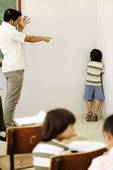Child Behavior Problem? Here's Your Child Development Solution. 
As children progress through their stages of development they are bound to experiment with countless forms of unacceptable behavior. If you react too harshly, you may incite the child to repeat this behavior as a means of punishing you when she feels irritable. Sometimes, it is not what we do in response to a specific behavior that causes a child to become stuck. It may be how we relate with the child at other times. For instance, if you impose boundaries on your child’s eating that are excessive or unnecessarily displease the child, the child may continue to place dangerous objects in his mouth even though he knows you don’t want him to, in an act of rebellion against your boundaries. Sometimes a specific behavior problem can be fostered by a more general error made by parents. For instance, if you routinely, excessively limit your child’s freedom of action and exploration, your child may feel compelled to defy reasonable and responsible boundaries. 
And there is yet another way that parents unwittingly cause their children to get stuck in problematic behavior. This one has to do with the relationship between emotionalism and reasonableness. If your household is overly emotional, the emotional intensity over-rules the child’s ability to make thoughtful, responsible choices. In a fit of emotionalism the child behaves impulsively. And there is yet another way that parents unwittingly block their child’s development OUT of problem behaviors. If you routinely slip into power-struggles with your child, pitting your will directly against his, and particularly if you do this with a competitive, one-upmanship type of attitude toward the child’s defiance, you set the child up to engage in reckless behavior as a way of winning the competition between the two of you. How you react to your child’s behavior makes a huge difference in the behavior your child chooses. And your expectations strongly influence how you react. If you are shocked by your child’s behavior, it means that your expectations were way off. If you automatically judge a child as a behavior problem because he displays behavior problems, your judgmental response produces more problems than it solves. 
Your child who seems like an angel one day will experiment with behaviors that seem downright diabolical the next day. Expect this and relate with it as an experiment calling for the right response that helps the child to outgrow it as soon as possible. For more great child development advice: |